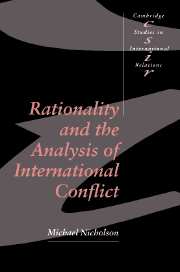PART IV - CONCLUSION
Published online by Cambridge University Press: 24 November 2009
Summary
The approach of this book has its critics, opponents and detractors. There are those who believe that social behaviour conducted by conscious, thinking beings is so different from the behaviour of the non-human world that any ‘scientific’ pretensions are illusory. Others regard such analysis as proper in some fields, such as economics, but not in others, such as the study of violence. Some of the problems are problems in the philosophy of science and must be discussed as such. However, there are also serious confusions amongst those who deny the legitimacy of a social scientific approach but who still want to develop theoretical concepts and use theories involving generalisations. For example, why have the classical balance of power theorists who deplore social science evaded the strictures of the Popperian philosophers of science?
Theory is not developed for its own sake. War poses one of the most severe moral problems facing humankind. The relation betwreen morality and social science is at times subtle and requires careful analysis.
- Type
- Chapter
- Information
- Rationality and the Analysis of International Conflict , pp. 221 - 222Publisher: Cambridge University PressPrint publication year: 1992



